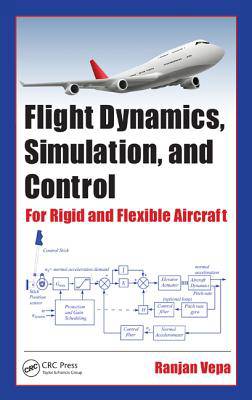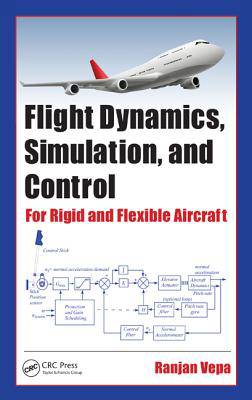
- Retrait gratuit dans votre magasin Club
- 7.000.000 titres dans notre catalogue
- Payer en toute sécurité
- Toujours un magasin près de chez vous
- Retrait gratuit dans votre magasin Club
- 7.000.0000 titres dans notre catalogue
- Payer en toute sécurité
- Toujours un magasin près de chez vous
Flight Dynamics, Simulation, and Control
For Rigid and Flexible Aircraft
Ranjan VepaDescription
Explore Key Concepts and Techniques Associated with Control Configured Elastic Aircraft
A rapid rise in air travel in the past decade is driving the development of newer, more energy-efficient, and malleable aircraft. Typically lighter and more flexible than the traditional rigid body, this new ideal calls for adaptations to some conventional concepts. Flight Dynamics, Simulation, and Control: For Rigid and Flexible Aircraft addresses the intricacies involved in the dynamic modelling, simulation, and control of a selection of aircraft. This book covers the conventional dynamics of rigid aircraft, explores key concepts associated with control configured elastic aircraft, and examines the use of linear and non-linear model-based techniques and their applications to flight control. In addition, it reveals how the principles of modeling and control can be applied to both traditional rigid and modern flexible aircraft.
Understand the Basic Principles Governing Aerodynamic Flows
This text consists of ten chapters outlining a range of topics relevant to the understanding of flight dynamics, regulation, and control. The book material describes the basics of flight simulation and control, the basics of nonlinear aircraft dynamics, and the principles of control configured aircraft design. It explains how elasticity of the wings/fuselage can be included in the dynamics and simulation, and highlights the principles of nonlinear stability analysis of both rigid and flexible aircraft. The reader can explore the mechanics of equilibrium flight and static equilibrium, trimmed steady level flight, the analysis of the static stability of an aircraft, static margins, stick-fixed and stick-free, modeling of control surface hinge-moments, and the estimation of the elevator for trim.
- Introduces case studies of practical control laws for several modern aircraft
- Explores the evaluation of aircraft dynamic response
- Applies MATLAB(R)/Simulink(R) in determining the aircraft's response to typical control inputs
- Explains the methods of modeling both rigid and flexible aircraft for controller design application
Written with aerospace engineering faculty and students, engineers, and researchers in mind, Flight Dynamics, Simulation, and Control: For Rigid and Flexible Aircraft serves as a useful resource for the exploration and study of simulation of flight dynamics.
Spécifications
Parties prenantes
- Auteur(s) :
- Editeur:
Contenu
- Nombre de pages :
- 692
- Langue:
- Anglais
Caractéristiques
- EAN:
- 9781466573352
- Date de parution :
- 18-08-14
- Format:
- Livre relié
- Format numérique:
- Genaaid
- Dimensions :
- 155 mm x 236 mm
- Poids :
- 1088 g

Les avis
Nous publions uniquement les avis qui respectent les conditions requises. Consultez nos conditions pour les avis.






